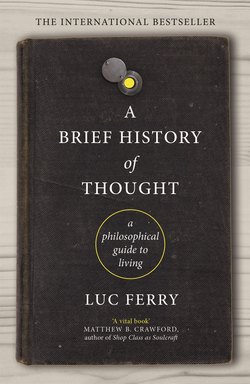Читать книгу A Brief History of Thought - Luc Ferry - Страница 21
На сайте Литреса книга снята с продажи.
Non-attachment
ОглавлениеStoicism, in a spirit remarkably close to that of Buddhism, appeals for an attitude of ‘non-attachment’ towards the things of this world. The Tibetan masters would no doubt have approved of this text from Epictetus:
The principal and highest form of training, and one that stands at the very entrance to happiness, is, that when you become attached to something, let it not be as to something which cannot be taken away, but rather, as to something like an earthenware pot or crystal goblet, so that if it breaks, you may remember what kind of thing it was and not be distressed. So in this, too, when you kiss your child, or your brother, or your friend, never give way entirely to your affections, nor free rein to your imagination; but curb it, restrain it, like those who stand behind generals when they ride in triumph and remind them that they are but men. Remind yourself likewise that what you love is mortal, that what you love is not your own. It is granted to you for the present, and not irrevocably, not for ever, but like a fig or a bunch of grapes in the appointed season … What harm is there while you are kissing your child to murmur softly, ‘Tomorrow you will die’? (Discourses, III, 24 84–8)
Let us be clear about what Epictetus is saying: it is not in any sense a case of being indifferent, as we might know it, and even less of lacking in the obligations which compassion imposes upon us in respect of others and, most importantly, of those close to us. He is saying that we must distrust all attachments that make us forget what the Buddhists call ‘impermanence’: the fact that nothing is stable in this world, that everything passes and changes, and that not to understand this is to create for oneself a hopelessness about what is past and a hope of what is yet to come. We must learn to content ourselves with the present, to love the present to the point of desiring nothing else and of regretting nothing whatsoever. Reason, which is our guide and which invites us to live in accordance with the harmony of the cosmos, must therefore be purified of that which weighs it down and falsifies it, whenever it strays into the unreal dimensions of time past and time future.
But once the truth of this is grasped we are still far from putting it into practice. Which is why Marcus Aurelius invites his disciples to embody it practically:
So, if you separate, as I say, from this governing self [i.e the mind] what is attached to it by passions, and what of time is left to run or has already flown, and make yourself like the sphere of Empedocles, ‘rounded, rejoicing in the solitude which is about it’, and practise only to live the life you are living, that is the present, then it will be in your power at least to live out the time that is left until you die, untroubled and dispensing kindness, and reconciled with your own good daemon. (Meditations, XII, 3)
As we shall see, this is precisely what Nietzsche refers to in his suggestive phrase, ‘the innocence of becoming’. To attain this level of wisdom, we must have the courage to live our lives under the guidance of the ‘future perfect’ tense.
